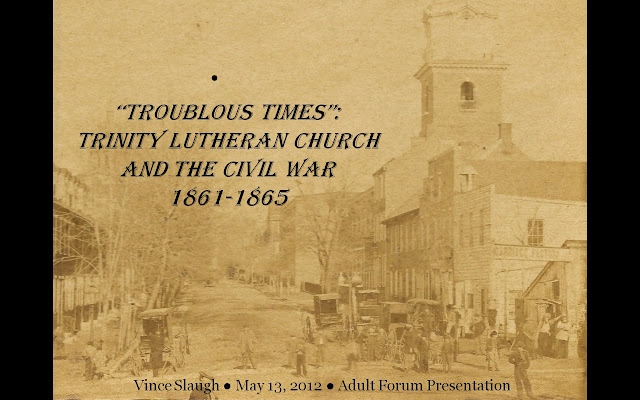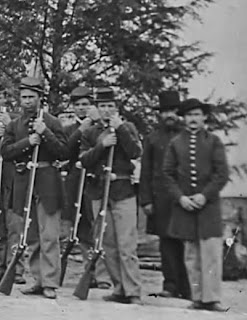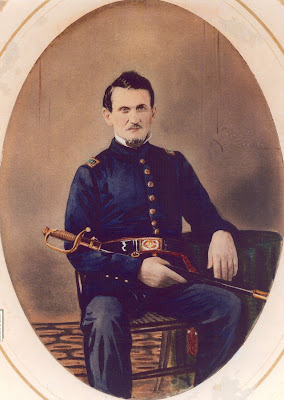 |
Trinity Lutheran Church, Lancaster, Pennsylvania
The General Synod met here in 1862.
An 1866 meeting of the Pennsylvania Ministerium
is depicted in the image above (from a stereoview, vws). |
As one of the few national church bodies not to have separated by the Civil War's outbreak in 1861, the
Evangelical Lutheran General Synod convened in Lancaster at Trinity Lutheran Church from May 1 to May 8, 1862. Without any dissenting Southerners present, the 100 or so Lutheran leaders finally forged a consensus to take a stand on the war's meaning, the morality of slavery, and the emerging question of emancipation.
The report of the proceedings makes it sound like many of the pastors who converged on Lancaster had already drafted their own remarks and opinions on the war, and it was up to the twenty-one man "Committee on the State of the Country" headed by Lutheran social welfare activist
William A. Passavant merge them into one voice. After five days of deliberations Passavant’s committee produced a set of five resolutions on secession, war, and slavery. The first two resolutions passed quickly and unanimously. The third resolution, declaring the rebellion to be “the natural result of the continuance and spread of domestic slavery in our land,” endorsed Lincoln’s proposal of April 1862 to fund a system of “constitutional emancipation” in any state willing to initiate such a system. It read:
Resolved, That while we recognize this unhappy war as a righteous judgment of God, visited upon us because of the individual and national sins of which we have been guilty, we nevertheless regard this rebellion as more immediately the natural result of the continuance and spread of domestic slavery in our land, and, therefore, hail with unmingled joy the proposition of our Chief Magistrate, which has received the sanction of Congress, to extend aid from the General Government to any State in which slavery exists, which shall deem fit to initiate a system of constitutional emancipation.
 |
Trinity Lutheran Church
Lithograph, 1861 |
|
As anticipated, it sparked a day’s worth of debate, the detailed minutes of which are presented at the end of this post. Some attendees criticized for being too weak, claiming constitutional emancipation validated the ownership of people as property. Others spoke against endorsing such a specific means of ending slavery, saying that the Lutherans had no more right to prescribe specific policies for Congress as Congress had to prescribe how the Lutherans interpret the Augsburg Confession. Interestingly, the abolitionist
Samuel Simon Schmucker of the Lutheran Seminary at Gettysburg suggested leaving out the subject of emancipation entirely due to the “unhappy effects” making statements on slavery had always had on other Synods.
The discussions reached a crescendo when Union-sympathizing Pastor Herman Eggers of Nashville, Tennessee, talked about the state of opinion in the South and asserted to loud applause: “A Church was not worth calling a church if it could not express its whole opinion on slavery—such a Church was nothing but a doughface. We have Union men in the South—some—and we want them to know what this Synod has to say, though no doubt it will hurt many of them. The Church in the South, as a Christian body, is dead, and requires a thorough regeneration, ‘to become a new man,’ before it can live again.”
Ultimately, the resolutions survived several attempts to amend and passed intact. A committee of five men took the resolutions directly to President Lincoln, who responded to the Lutherans with the following remarks on Tuesday, May 13:
GENTLEMEN: I welcome here the representatives of the Evangelical Lutherans of the United States. I accept, with gratitude, their assurances of sympathy and support of that enlightened, influential, and loyal class of my fellow-citizens in an important crisis, which involves, in my judgment, not only the civil and religious liberties or our own dear land, but in a large degree the civil and religious liberties of mankind, in many countries and through many ages. You well know, gentlemen, and the world knows, how reluctantly I accepted this issue of battle forced upon me, on my advent to this place, by the internal enemies of our country. You all know, the world knows, the forces and the resources the public agents have brought into employment to sustain a Government against which there has been brought not one complaint of real injury, committed against society at home or abroad. You all may recollect that, in taking up the sword thus forced into our hands, this Government appealed to the prayers of the pious and good, and declared that it placed its whole dependence upon the favor of God. I now humbly and reverently, in your presence, reiterate the acknowledgement of that dependence, not doubting that, if it shall please the Divine Being who determines the destinies of nations that this shall remain a united people, they will, humbly seeking the Divine guidance, make their prolonged national existence a source of new benefits to themselves and their successors, and to all classes and conditions of mankind. [DEE 5/16/1862]
The 1862 Lutheran General Synod convention represents one more example of Northerners’ awakening to emancipation as a real possibility that occurred over the course of that year. It parallels recent letters from our Lancaster soldier-correspondents in Tennessee who have begun to witness that the military mission is difficult to untangle from slavery, and that the current policy is unsustainable (links:
Sypher,
Witmer). The
May 10, 1862, Philadelphia Press cited the Lutherans' actions in Lancaster as evidence of a shifting tide in Northern opinion.
The stance on slavery also had unintended consequences for the Lutherans, which was very divided by two distinct visions for the Lutheran Church in the New World in years following the Second Great Awakening. Pietists wanted to see a Lutheran Church emphasizing revivalism and spirituality in close union with other Protestants, while confessionalists stressed a stricter adherence to the Lutheran Confessions. In the next two General Synod meetings, in 1862 and 1864, the confessionalist-leaning
Pennsylvania Ministerium walked out and was locked out of proceedings. In 1866, the Pennsylvania Ministerium met again at Trinity Lutheran Church in Lancaster to announce the formation of a confessionalist national Lutheran church body. The "
General Council" resulted, although it ultimately failed to meet expectations due to its inability to woo more conservative Midwestern Lutherans (e.g., the Missouri Synod).
Many angles--religious, political, and social--make this convention extremely fascinating for its place in the Union war effort and its place in shaping the course of Lutheranism. For more information and its consequence for the Lutherans, see:
From the May 15, 1862,
Lutheran Missionary: (
alternate link)




















